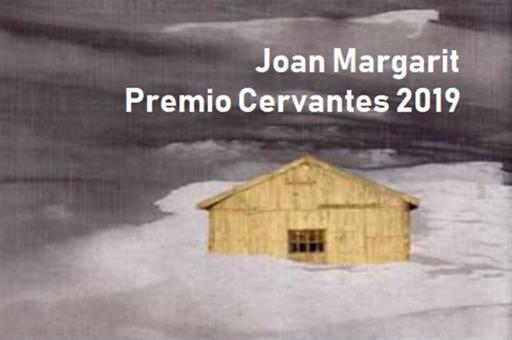The decision of the jury was announced by the Acting Minister for Culture and Sport, at an event held at the ministerial headquarters, in the presence of the President of the Jury and winner of the Cervantes Prize in 2018, Ida Vitale.
The jury awarded this prize to Joan Margarit for his poetry of profound significance and constant innovative clarity of language, enriching both the Spanish and Catalan languages and representing the plurality of culture on the Iberian Peninsula from a universal standpoint of great mastery".
Jury
This was made up of María Paz Battaner Arias, representing the Royal Spanish Academy; Pablo de Santis, on behalf of the Argentinean Academy of Literature; María Luisa Sotelo Vázquez, on behalf of the Conference of Spanish University Rectors (Spanish acronym: CRUE); Bernal Herrera Montero, on behalf of the Union of Latin-American Universities (Spanish acronym: UDUAL); Raquel Caleya Caña on behalf of the Cervantes Institute; Eduardo Lago Martínez, on behalf of the Directorate-General of Libro y Fomento de la Lectura [Reading and encouraging reading];Arsenio Escolar Ramos, on behalf of the Federation of Spanish Journalism Associations (Spanish Acronym: FAPE); Leticia Amato, on behalf of the Federation of Latin-American Journalists (Spanish acronym: FELAP); and Susan Byrne, on behalf of the International Association of Hispanists.
Also present were the last two winners of this prize, Sergio Ramírez (2017) and Ida Vitale (2018). The Director of the Cabinet Office of the Ministry of Culture and Sport, Carlos Alberdi Alonso, acted as non-voting Secretary and Begoña Cerro Prada, the Assistant Director-General for the Promotion of Books, Reading and Spanish Literature, recorded the minutes, also without voting rights.
Biography
Joan Margarit i Consarnau (Sanahuja, Lleida, 1938) is a poet and an architect. He began his career in poetry in 1963 with the publication of the poem "Cantos para la coral de un hombre solo", in Spanish. After a long break, he published "Cronica" in 1975. As of 1980, he started to publish his poems in Catalan. He translated a significant part of his poems penned in Catalan into Spanish. As a translator, he was commissioned to translate works of poets such as Thomas Hardy, Elizabeth Bishop and Rainer Maria Rilke, into Spanish and Catalan.
He received National Appreciation Prize(1984 and 2008) and the Rosalía deCastroPrize(2008). He was awarded the National Poetry Prize 2008, from the Ministry of Culture for his work "Casa de Misericordia". In 2013, he won the Víctor Sandoval Prize for Poets from the Latin World in Mexico (for complete works) together with the Mexican poet, José Emilio Pacheco, also a winner of the Cervantes Prize. In 2017, he was awarded the Pablo Neruda Ibero-American Prize for Poetry in Chile. In 2019 he was awarded the Queen Sofía Ibero-American Poetry Prize.
Among his awards for his work in Catalan, worthy of mention are Cants d'Hecatónim de Tifundis (1982), which won the Miquel de Palol Prize and the Serra d'Or Appreciation Prize; Vell malentès (1981),which won the Vicent Andrés Estellés Prize and the Appreciation Prize for Poetry in Catalan; Mar d'hivern (1986), which won the Carles Riba Poetry Prize; La dona del navegant (1987), which won the Serra d'Or Appreciation Prize; Càlcul d'estructures (2005), which won the Serra d'Or Appreciation Prize; Casa de Misericòrdia (2007), which won the Cavall Verd Prize, the National Literature Prize from the Regional Government of Catalonia and the Appreciation Prize for Poetry in Catalan. In 2005, Els primers freds was awarded the Cadaqués a Quima Jaume Prize. In 2015, he won the Jaume Fuster Prize from the Association of Writers in Catalan.
His works have been translated into German, Basque, Hebrew, French, English, Portuguese and Russian.
History of the Prize
Through the award of this prize, along with the cash prize of 125,000 euros, annual tribute is publicly made to a writer, who, through his or her work, has contributed to enriching Hispanic literary heritage.
The Cervantes Prize may be bestowed on any author whose literary contribution is fully or to a large extent written in Spanish. Candidates for the prize may be put forward by the Spanish Language Academies, previous winners, the institutions which by their very nature, aims or content are intrinsically linked to Spanish literature and by members of the jury.
The list of past winners provides clear evidence of just how significant this prize is for culture in the Spanish language:
- 1976 Jorge Guillén
- 1977 Alejo Carpentier
- 1978 Dámaso Alonso
- 1979 Jorge Luis Borges y Gerardo Diego
- 1980 Juan Carlos Onetti
- 1981 Octavio Paz
- 1982 Luis Rosales
- 1983 Rafael Alberti
- 1984 Ernesto Sábato
- 1985 Gonzalo Torrente Ballester
- 1986 Antonio Buero Vallejo
- 1987 Carlos Fuentes
- 1988 María Zambrano
- 1989 Augusto Roa Bastos
- 1990 Adolfo Bioy Casares
- 1991 Francisco Ayala
- 1992 Dulce María Loynaz
- 1993 Miguel Delibes
- 1994 Mario Vargas Llosa
- 1995 Camilo José Cela
- 1996 José García Nieto
- 1997 Guillermo Cabrera Infante
- 1998 José Hierro
- 1999 Jorge Edwards
- 2000 Francisco Umbral
- 2001 Álvaro Mutis
- 2002 José Jiménez Lozano
- 2003 Gonzalo Rojas
- 2004 Rafael Sánchez Ferlosio
- 2005 Sergio Pitol
- 2006 Antonio Gamoneda
- 2007 Juan Gelman
- 2008 Juan Marsé
- 2009 José Emilio Pacheco
- 2010 Ana María Matute
- 2011 Nicanor Parra
- 2012 José Manuel Caballero Bonald
- 2013 Elena Poniatowska
- 2014 Juan Goytisolo Gay
- 2015 Fernando del Paso
- 2016 Eduardo Mendoza
- 2017 Sergio Ramírez
- 2018 Ida Vitale
Non official translation





